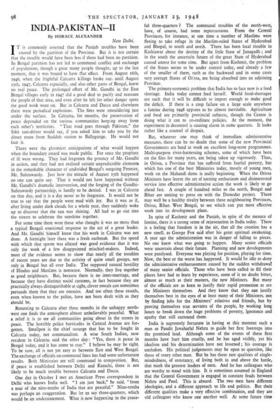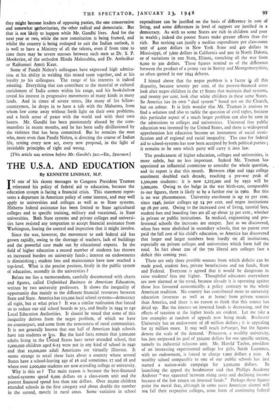INDIA-PAKISTAN-II
By HORACE ALEXANDER
New Delhi. T T is commonly asserted that the Punjab troubles have been I caused by the partition of the Province. But it is not certain that the trouble would have been less if there had been no partition. In Bengal partition has not led to communal conflict and exchange of populations, though a great many people thought, up to the last moment, that it was bound to have that effect. From August 16th, 1946, when the frightful Calcutta killings broke out, until August 15th, 1947, Calcutta especially, and also other parts of Bengal, knew
no real peace. The prolonged effort of Mr. Gandhi in the East Bengal villages early in 1947 did a good deal to pacify and reassure the people of that area, and even after he left for other danger spots the good work went on. But in Calcutta and Dacca and elsewhere there were periodical explosions. The fires were smouldering just under the surface. In Calcutta, for months, the preservation of peace depended on the various communities keeping away from each other's territories. " That road goes through Pakistan," the Sikh taxi-driver would say, if you asked him to take you by the direct route from Sealdah station to Ballygunge. He would not face it.
There were the gloomiest anticipations of what would happen when the boundary award was made public. For once the prophets of ill were wrong. They had forgotten the potency of Mr. Gandhi in action, and they had not realised certain unpredictable elements in the remarkable character of undivided Bengal's outgoing Premier, Mr. Suhrawardy. Just how the miracle of August 15th happened no one can quite say. That it would not have happened without Mr. Gandhi's dramafic intervention, and the forging of the Gandhi- Suhrawardy partnership, is hardly to be denied. I was in Calcutta on that day, and it is a day never to be forgotten. It would not be true to say that the people went mad with joy. But it was as if, after living under dark clouds for a whole year, they suddenly woke up to discover that the sun was shining. All had to go out into the streets to celebrate the sunshine together.
For some time there were those who thought it was no more than a typical Bengali emotional response to the act of a great leader. And Mr. Gandhi himself knew that his work in Calcutta was not done. A fortnight later there was a fresh outbreak. But the speed with which that spasm was allayed was good evidence that it was only the work of a few disappointed mischief-makers. Indeed, most of the evidence seems to show that nearly all the troubles of recent years are due to the activity of quite small groups, not only in Bengal but all over India. The supposed natural hostility of Hindus and Muslims is nonsense. Normally, they live together as good neighbours. But, because there is no inter-marriage, and because they have distinct social customs, in fact because they are practically always distinguishable at sight, clever rascals can sometimes persuade them that they are enemies. And too often these rascals, even when known to the police, have not been dealt with as they should be.
Returning to Calcutta after three months in the unhappy north- west one finds the atmosphere almost unbelievably peaceful. What a, relief it is to see all communities going about in the streets in peace. The horrible police barricades in Central Avenue are for- gotten. Smallpox is the chief scourge that has to be fought in Calcutta today, not communalism. A wise South Indian, now resident in Calcutta, said the other day: " Yes, there is peace in Bengal today, and it has come to stay." I believe he may be right. To be sure, all is not yet easy as between East and West Bengal. The exchange of officials on communal lines has had some unfortunate results. Both Ministries are still communal in composition. But, if peace is established between Delhi and Karachi, there is not likely to be much trouble between Calcutta and Dacca.
One day in October I met an American Press correspondent in Delhi who knows India well. " I am just back," he said, " from a tour of the nine-tenths of India that are peaceful." Nine-tenths was perhaps an exaggeration. But let us say three-quarters, which would be an understatement. What is now happening in the peace- ful three-quarters ? The communal troubles of the north-west, have, of course, had some repercussions. From the Central Provinces, for instance, at one time a number of Muslims were fleeing to take refuge in the Muslim-ruled States of Hyderabad and Bhopal, to south and north. There has been local trouble in Kathiawar about the destiny of the little State of Junagadh ; and in the south the uncertain future of the great State of Hyderabad caused unrest for some time. But apart from Kashmir, the problem of the States seems to be under control today, and already a few of the smaller of them, such as the backward and in some cases very corrupt States of Orissa, are being absorbed into an adjoining Province.
The primary economic problem that India has to face now is a food shortage. India today cannot feed herself. World food-shortages are such that it will be difficult to import enough to make good the deficit. If there is a crop failure on a large scale anywhere a famine during 1948 appears to be almost inevitable. Agriculture and food are primarily provincial subjects, though the Centre is doing what it can to co-ordinate policies. At the moment, the experiment in decontrol is causing alarm in some quarters. It looks rather like a counsel of despair.
But, whatever one may think of immediate administrative measures, there can be no doubt that some of the new Provincial Governments are hard at work on excellent long-term programmes. Multi-purpose river-harnessing schemes, some of which have been on the files for many years, are being taken up vigorously. Thus, in Orissa, a Province that has suffered from fearful poverty, but which has one of the best Ministries today, mostly of young men, work on the Mahandi dams is really beginning. When the Orissa Ministers have learnt the art of turning enthusiasm and disinterested service into effective administrative action the work is likely to go ahead fast. A couple of hundred miles to the north, Bengal and Bihar are uniting to press on with the Damodar project. There may well be a healthy rivalry between these neighbouring Provinces, Orissa, Bihar, West Bengal, to see which can put most effective work into its development plans.
In spite of Kashmir and the Punjab, in spite of the menace of famine, there is a strong sense of rejuvenation in India today. There is a feeling that freedom is in the air, that all the creation has a new smell, as George Fox said after his great spiritual awakening. A year ago the administration was in danger of falling to pieces. No one knew what was going to happen. Many senior officials were uncertain about their future. Planning and new developments were paralysed. Everyone was playing for position, playing for time. Now, the best or the worst has_happened. It would be idle to deny the administrative embarrassment caused by- the sudden withdrawal of many senior officials. Those who have been called to fill their places have had to learn by experience, some of it no doubt bitter, almost as much as their masters, the new Ministers. But many of the officials are as keen to justify their rapid promotion as are the Ministers themselves. And they know that they can justify themselves best in the eyes of at least many of their Ministers, not by finding jobs for the Ministers' relatives and friends, but by proving themselves true servants of the people, by working long hours to break down the huge problems of poverty, ignorance and apathy that still surround them.
India is supremely fortunate in having at this moment such a man as Pandit Jawaharlal Nehru to guide her first footsteps into the promised land. Although some of the events of these first months have hurt him cruelly, and he has aged visibly, yet his idealism and his determination have not lessened ; his courage is unshaken. His political judgements may be open to question, like those of every other man. But he has those rare qualities of single- mindedness, of constancy, of living both in and above the battle, that mark the greatest leaders of men. And he has colleagues who are worthy to stand with him. It is sometimes assumed in England that the Central Government is engaged in constant feuds between Nehru and Patel. This is absurd. The two men have different ideologies, and a different approach to life and politics. But their different qualities make a very effective combination, and they are old colleagues who know one another well. At some future time they might become leaders of opposing parties, the one conservative and somewhat apthoritarian, the other radical and democratic. But that is not likely to happen while Mr. Gandhi lives. And for the next year or two, while the new constitution is being framed, and whilst the country is being reshaped to suit the Indian outlook, it is well to have a Ministry of all the talents, even if from time to time there may be severe stresses between such men as Dr. S. P. Mookerjee, of the orthodox Hindu Mahasabha, and Dr. Ambedkar or Rajkumari Amrit Kaur.
Some of Pandit Nehru's colleagues have expressed high admira- tion at his ability in welding this mixed team together, and at his loyalty _to his colleagues. The range of his interests is indeed amazing. Everything that can contribute to the material or cultural enrichment of India comes within his range, and his bookshelves reveal his interest in progressive movements of many kinds in many lands. And in times of severe stress, like many of his fellow- countrymen, he drops in to have a talk with the Mahatma, from whom few come away without fresh light on their own problems, and a fresh sense of peace with the world and with their own hearts. Mr. Gandhi has been passionately abused by the corn- munalists in recent months, and he has been sadly disillusioned by the violence that has been committed. But he remains the man who, more even than Pandit Nehru, is directing the course of Indian life, testing every new act, every new proposal, in the light of inviolable principles of right and wrong.
[This article was written before Mr. Gandhi's fast.—Eo., Spectator.]































 Previous page
Previous page